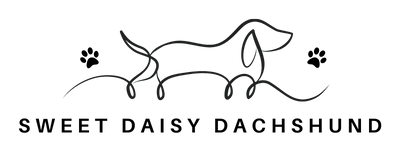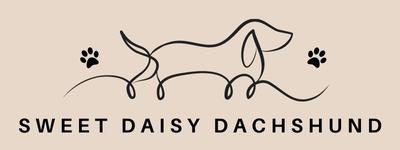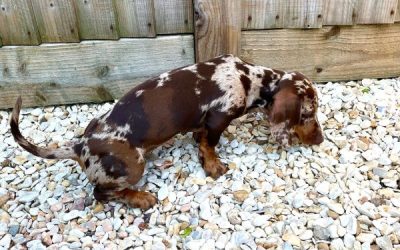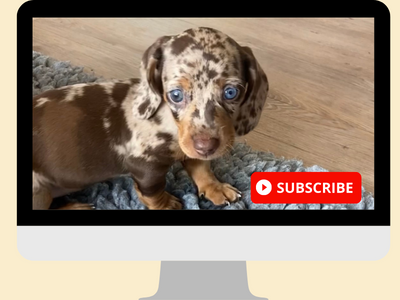Our dachshund puppy continues to develop fast at 13 to 14 weeks old. This is a wonderful and exciting stage in your puppy’s life that will involve many joyful moments and challenges alike. Around this age, your puppy will enter the testing period of their development. This means they will be going through some emotional and behaviour changes. Therefore it’s important for you to understand what to anticipate and how to manage your puppy’s behaviour at this stage.


Our Dachshund Puppy Continues To Develop Fast At 13 To 14 Weeks Old – Table Of Content:
- Physical and behavioural changes in our puppy
- Our dachshund puppy has started teething
- Yay…our puppy is making great progress with potty training!
- How are we getting on with re-call training?
- We love riding on the bike
Our Dachshund Puppy Continues To Develop Fast At 13 To 14 Weeks Old
Physical and behavioural changes in our puppy
It’s amazing how much a puppy can grow in just two weeks! We have certainly seen some big changes, both physical and behavioural, when Daisy turned 13 weeks old. Although she had been growing steadily over the last few weeks, it seems like she has suddenly gone through a growth spurt. She no longer looks like that fragile little puppy we brought home when she was 9 weeks old. Not only has she grown in size but in strength and stamina too, which very much shows during her play and outings.
Her pesonality has blossomed and her growing confidence and curiosity have turned her into an adventurous pup who is eager to explore and learn. And she has already made many hooman and doggie friends in our neighbourhood thanks to her playful and loving personality. She is definitely not shy especially when it comes to expressing her wishes and is being quite vocal about it. 🙂

Daisy’s behaviour is also becoming more challenging as she is starting to test the boundaries. And sometimes our patience too! But this is an important stage of their development during which they learn the limits and to obey the rules. The way forward is to persevere with behavioural training to help your puppy understand what behaviour is acceptable and to establish ranking within your family.
Our dachshund puppy has started teething
Daisy has now started teething and is obsessed with anything she can sink her teeth into (including our feet and hands). Thankfully, there are ways how we can help make the process easier for her. And to ensure that she is able to express her need to chew without risking any damage to us or our belongings.
Puppies start losing their baby teeth around the age of 12 to 14 weeks as the permanent teeth begin to erupt. Usually by the age of 6 months, your puppy’s 28 baby teeth should be replaced by their 42 permanent teeth. You may notice some light bleeding as their teeth fall out. And you may even find some teeth around the house. But it’s very common for puppies to swallow their teeth while they are eating. But don’t worry, this causes them no harm.
Teething will be a stressful time for your puppy and yourself as you will be faced with lots of chewing, biting, nipping, mouthing and rough play. However, these are all natural behaviours during the teething stage and can’t be avoided. Instead you can help your puppy by showing them what behaviour is acceptable and by re-directing their attention to a different activity or toy/chew when needed.

Start behaviour training with your puppy from week one and use a strong verbal cue to let them know that what they are doing is wrong. Your body language and the tone of your voice play an important role. Your body language needs to translate to ‘I am the boss here’ and your voice needs to be stern and confident, however not loud and shouty. Re-direct your puppy’s attention to a different toy or activity and do not forget to reward your puppy with lots of praise once they calm down because it helps them understand what behaviour is expected of them.
To help your puppy with teething discomfort, you can provide them with various teething toys. Natural chews or frozen food such as a carrot stick or a frozen cube of broth are excellent at reducing the pain. Another great way to help relieve sore gums is to freeze a cloth soaked in water and let your puppy chew on it. Whatever chew or toy you chose, always supervise your puppy to make sure they can’t choke or harm themselves.


Yay…our puppy is making great progress with potty training!
If you follow our dachshund puppy diary then you know that we have worked hard on potty training ever since day one. We took Daisy out every time she woke up, ate and played and about every 30 minutes in between. If we knew it was time for her to go but she didn’t do her business, we would put her in her playpen and try again in about 5-10 minutes.
We are really happy to say that all this effort is paying off and Daisy is making a great progress with potty training! She hasn’t had any accidents indoors for almost 3 weeks now. So we are absolutely chuffed to bits with how well she is doing! However, it’s too early to assume that she is fully potty trained.
Your puppy should be fully potty trained by 6 months but it’s common for them to go through a period of regression. This happens usually around the 4 to 6 month mark, so it’s important to continue with potty training and stay consistent. However, if your puppy is doing really well, we would encourage you to take the next step, which is being more reactive rather than proactive. Give your puppy a chance to show you if they can manage going to potty on their own.
We are still being proactive with Daisy’s potty training to some extend. We still take her out when she wakes up, when we come home from any outings, before we have any visitors and before her bedtime. But we have given Daisy more freedom to give her an opportunity let us know when she needs to go potty. If the garden door is open, she will go out herself to do her business. Otherwise, she will go to the garden door and will either ring the bell or bark to announce it’s time to go potty. Either way, we still go out with her and reward her with lots of praise for doing her business outside.
You can read more about how we potty train our dachshund puppy in our article How to potty train a dachshund puppy easily and fast.

How are we getting on with re-call training?
Last time we mentioned that we started training re-call quite intensively so here is an update on how we are getting on. Plus we promised you to share some helpful tips on how to approach this training.
Daisy is doing quite well with re-call indoors and in our garden so we have moved onto the next step in the training process. This means we have now started training re-call in the park using a long training lead (ours is 10 meters long). As expected, her re-call in the park is nowhere near perfect yet because there are plenty more distructions around her. But we want to ensure that each re-call is successful. So if we know she is unlikely to come when called, then we will not re-call at all. This way we will not over-use the verbal cue we are using for this command, which is really important at this stage.
So how should you approach re-call training and when should you start? You should start training re-call as soon as you can the first week your puppy is with you. Except, you will be training your puppy name association first to set a strong foundation for re-call training. You first need to teach your puppy what their name is and what it sounds like. And here are a few tips on how to do it.
Tips on name association training:
Step 1: sit in front of your puppy and feed them a treat while saying their name – repeat several times each time you train
Step 2: stand in front of your puppy while holding a treat in your hand – put your hand in front of your puppy’s nose and take a couple of steps back.- say your puppy’s name once ot twice while your puppy follows you
Step 3: repeat the above step but while moving around a bit more – e.g. walk in a circle or walk towards the door
Step 4: play games with your puppy while using their name – you will need another person to help with this – e.g. throw a ball or a toy to each other and shout out your puppy’s name as your puppy runs towards you to get the toy – try to make these games very exciting for your puppy and always reward with lots of praise and cuddles
Step 5: if you feel your puppy is ready, repeat steps 3 to 4 outdoors, where there are more distractions
Step 6: when ready, train steps 3 to 4 in a park and expect it may be challenging for your puppy to give you their full attention as they will be distracted by many things happening around them

How to start re-call training:
Step 1: don’t let your puppy off lead and instead use a long training lead so you have a way of controlling your puppy at all times
Step 2: always use all 3 types of reward every time your puppy responds: lots of praise, a high reward treat and a cuddle/pet to motivate your puppy
Step 3: start training in your garden and gradually extend the distance between you and your pup
Step 4: add more ditractions by moving the training to a park
Step 5: once your puppy has mastered re-call while on the lead, it’s time to practise re-call off lead – again start in your garden or in a secure fenced field or park so your puppy can’t escape if tempted
The important thing to remember when training re-call is that you need to set your puppy up for success right from the beginning. If each re-call is successful then your puppy will learn that they will be rewarded every time they come. Therefore they will be more motivated to come to you next time.
So what does this mean? Be sure to re-call only when you know your puppy is sure to come. Or when you have a way of directing them towards you. For example, if your puppy suddenly gets distracted, don’t use the re-call command as your puppy will be unlikely to come. Wait until your puppy starts paying attention again. Or when using a training lead, direct your puppy towards you so they do come to you eventually.
Do not waste your re-call verbal cue on situations when you are unsure of the re-call success otherwise your puppy will learn they don’t have to come each time you call.
Re-call is a difficult command to learn for young puppies and therefore the training will require lots of patience and dedication. But it’s a wonderful feeling for both you and your puppy once they are able to run free when on outings.
We love riding on the bike
Because we are aware that it will take some time before Daisy will be able to have a free run around the park, we looked into other options how to make our outings more interesting for both her and us. And cycling with Daisy in a basket seemed like a perfect option to us! She absolutely loves being in her basket as she gets a chance to explore the world from a different point of view.
If you are thinking about purchasing a bike basket for your puppy, we would highly recommend getting a front basket. This is a much safer option than a rear basket as you will be able to see and control your puppy at all times.
There were so many different baskets to chose from but we decided for this metal basket at the end. It is very sturdy with secure bike handle fastening hence it’s safe and secure for Daisy to sit in. Plus it will be easy to clean. And to make it more comfortable, we have just put a blanket inside that she can sit on. We would also recommend getting a metal support frame the basket can rest on when your puppy gets a bit older and heavier. Daisy is still quite small but we are planning to get the metal support frame when she is close to 5kg in weight.
If you would like to check out this basket then you can do so on Amazon UK or Amazon US.

Our Dachshund Puppy Continues To Develop Fast At 13 To 14 Weeks Old – Watch Us On YouTube
Our Dachshund Puppy Continues To Develop Fast At 13 To 14 Weeks Old. If you would like to see what Daisy was up to in the last two weeks then make sure to watch our video below.
Our Dachshund Puppy Continues To Develop Fast At 13 To 14 Weeks Old- Let Us Know What You Think!
If you have questions or need further advice on dachshund puppy’s development at 13 to14 weeks, comment below so other pet owners can benefit from your questions and experiences.
Join ‘Dachshund Buddies’ On Facebook!
Join our ‘Dachshund Buddies’ Facebook community dedicated to all things dachshund! It is a great way to connect with other dachshund owners and enthusiasts, who are always there to help each other. You will find plenty of interesting conversations and valuable tips, tricks and advice to help you care for your loving doxie.








0 Comments